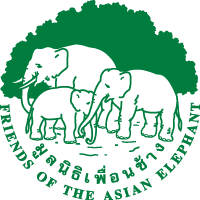All of our keepers are an integral part of the operation of our hospital. We have around 10 keepers at any given time (depending on the amount of in-patients). What may not be easy to communicate on paper is the special bond each keeper shares with their elephant, and the amount of love and commitment they put forth.
These keepers work tremendously hard, spending all of their time and energy looking after the elephants and the hospital. Their daily tasks include feeding, bathing, exercising, helping administer medical treatments, and cleaning their pens. It’s important not to forget that elephants eat up to 10% of their body weight daily – about 200 kilos of grass and other plants. It requires a constant effort from keepers to receive and prepare this food, then feed the elephants. Afterwards, cleaning of the pens requires shoveling and carting off of about 200 kilos of waste as well.
Above and beyond, our keepers build fires to warm the elephants during cold season, sleep alongside babies and patients when they need comfort, and keep them active and engaged throughout the day. They are often so close that the elephants sometime squeak and trumpet even if the keepers leave for a quick lunch break. In every way possible, our staff are true friends of these Asian elephants.
Groundskeepers
Further, it is important to keep in mind that the hospital is set on approximately 11.75 acres of jungle forest land (29 rai) in northern Thailand. There is a constant need to sweep leaves and dust, keeping the grounds safe and clean for the elephants and visitors.
This is also why there are three additional groundskeeper/elephant keepers – they function to help keep operations around the elephants and the outside area running smoothly. All day long they are maintaining the grounds, helping check in new arrivals, receiving and storing food from vendors (fresh and dry grasses, bananas, peanuts), looking after the water systems, trimming trees, and assisting anywhere else needed. The three general groundskeepers and elephant supervisor/keepers are quite busy throughout the day and work as a bridge between ordinary keepers, outpatient owners and keepers, food vendors, and the vets and administration.
